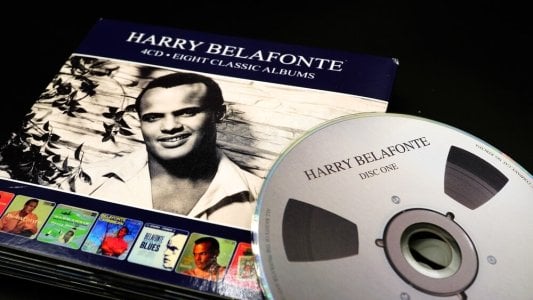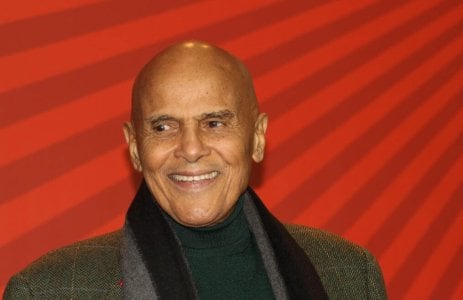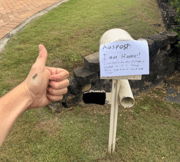The extraordinary life and career of Harry Belafonte: Remembering the late ‘Day-O’ singer, actor, and activist
- Replies 11
We here at Seniors Discount Club are saddened by the recent passing of one of the music and entertainment world's greats, Harry Belafonte. He was 96 and passed away due to congestive heart failure, according to a spokesperson.
The singer, actor, and activist worked tirelessly to break racial barriers and fought for equality and civil rights.
But you likely know him best from his hugely popular song ‘Day-O’. A live performance of his song ‘Day-O’ is linked below:
Now, let’s take a look back and honour Mr Belafonte’s incredible life.
Harry Belafonte was born in 1927 in working-class Harlem, New York. He spent eight years of his childhood in Jamaica but soon returned to New York to continue his studies. However, Mr Belafonte had dyslexia and struggled to keep up with his schoolwork. This led to him dropping out early in his teen years, and he ended up working odd jobs in markets and the city’s garment district.
At age 17, Mr Belafonte signed up to be part of the Navy in March 1944 and worked as a munitions loader at a base in New Jersey.
After the war, Mr Belafonte realised he wanted to be an actor. He took acting classes alongside star-studded names such as Marlon Brando (A Streetcar Named Desire, The Godfather) and Walter Matthau (Hello, Dolly! and Dennis the Menace).
He also sang folk, pop and jazz numbers at various New York clubs, backed by equally-famous musicians such as Miles Davis and Charlie Parker.
Because of his good looks and warm, melodic voice, Mr Belafonte rose to fame as a matinee idol in the 1950s, becoming one of the few minorities to gain stardom in a segregated nation.
By 1954, Mr Belafonte was considered a star in the music industry. He released his debut album that same year, which featured a collection of traditional folk songs, and his second album took the number one spot on the Billboard charts in 1956.
But this success was outdone by his third album, Calypso, which featured songs inspired by his Jamaican heritage.
Calypso brought a ‘feel-good’ vibe to the music industry in the 50s and was considered a new style that many loved. This album became the first one to sell more than a million copies in the US.
The lead track, ‘Day-O’ (also known as ‘The Banana Boat Song’), is one of his signature songs. ‘Day-O’ spent 18 weeks in the UK singles chart and three weeks at the number two spot.
Are you wondering where you recognise the song from? Mr Belafonte’s 1956 recording of ‘Day-O’ is heard in the 1988 film Beetlejuice during a scene in which dinner guests are supernaturally compelled to dance. How’s that for some trivia?
He also released his version of ‘Mary’s Boy Child’, which became a UK chart-topper and ‘Island in the Sun’, which claimed the number three spot in the charts.
The singer and actor released 30 studio albums, plus collaborative albums with other famous singers such as Lena Horne, Nana Mouskouri and Miriam Makeba. His collaboration with Miriam won him one of his two Grammy awards.
Mr Belafonte was later awarded a lifetime achievement Grammy and the Academy’s President’s Merit Award for his contributions to the entertainment industry.
Bob Dylan’s first recording was on Mr Belafonte’s 1962 album, Midnight Special. The previous year, Mr Belafonte had been hired by Frank Sinatra to perform at John F Kennedy’s presidential inauguration.
Just like his music career, Mr Belafonte’s acting career also rose to great heights. The singer won a Tony award in 1954 for his appearance in the musical revue show John Murray Anderson’s Almanac. He also appeared in several feature films, most notably as one of the leads in Island in the Sun, along with James Mason, Joan Fontaine, and Joan Collins.
A third film was offered to him – an adaptation of Porgy and Bess – but he found it ‘racially demeaning’ and subsequently turned it down. It was because of this decision that he sprung into a lifetime of racial activism. Citing that when he refused the role, it ‘helped fuel the rebel spirit’ that was brewing in him.
He was mentored by renowned activist Martin Luther King Jr, who he later bailed out of an Alabama jail in 1963. Mr Belafonte co-organised the march on Washington that became the backdrop for Martin Luther King Jr’s ‘I Have a Dream’ speech.
He was appointed a UNICEF Goodwill Ambassador in 1987 and later campaigned to eradicate AIDS from Africa. After recovering from prostate cancer in 1996, he advocated for awareness of the disease.
Figures including Joe Biden, the rapper Ice Cube and Mia Farrow (Rosemary’s Baby) paid tribute to Mr Belafonte on social media. President Biden even said that Mr Belafonte was a ‘ground-breaking American who used his talent and voice to help redeem the soul of [the] nation’.
He continued: ‘Harry Belafonte’s accomplishments are legendary, and his legacy of outspoken advocacy, compassion, and respect for dignity will endure forever.’
Ex-President Barack Obama also shared his tribute online, saying that Mr Belafonte was a ‘barrier-breaking legend who used his platform to lift others up’.
Bernice King, daughter of Martin Luther King Jr, shared a photo of Mr Belafonte at her father’s funeral and said he ‘showed up’ for her family in ‘very compassionate ways’.
His legacy will live on for many years to come.

Throughout his life, Harry Belafonte proved that one can channel their artistic talents to entertain, educate, and inspire. Our thoughts and prayers are with his family and friends at this time.
The singer, actor, and activist worked tirelessly to break racial barriers and fought for equality and civil rights.
But you likely know him best from his hugely popular song ‘Day-O’. A live performance of his song ‘Day-O’ is linked below:
Now, let’s take a look back and honour Mr Belafonte’s incredible life.
Harry Belafonte was born in 1927 in working-class Harlem, New York. He spent eight years of his childhood in Jamaica but soon returned to New York to continue his studies. However, Mr Belafonte had dyslexia and struggled to keep up with his schoolwork. This led to him dropping out early in his teen years, and he ended up working odd jobs in markets and the city’s garment district.
At age 17, Mr Belafonte signed up to be part of the Navy in March 1944 and worked as a munitions loader at a base in New Jersey.
After the war, Mr Belafonte realised he wanted to be an actor. He took acting classes alongside star-studded names such as Marlon Brando (A Streetcar Named Desire, The Godfather) and Walter Matthau (Hello, Dolly! and Dennis the Menace).
He also sang folk, pop and jazz numbers at various New York clubs, backed by equally-famous musicians such as Miles Davis and Charlie Parker.
Because of his good looks and warm, melodic voice, Mr Belafonte rose to fame as a matinee idol in the 1950s, becoming one of the few minorities to gain stardom in a segregated nation.
By 1954, Mr Belafonte was considered a star in the music industry. He released his debut album that same year, which featured a collection of traditional folk songs, and his second album took the number one spot on the Billboard charts in 1956.
But this success was outdone by his third album, Calypso, which featured songs inspired by his Jamaican heritage.
Calypso brought a ‘feel-good’ vibe to the music industry in the 50s and was considered a new style that many loved. This album became the first one to sell more than a million copies in the US.
The lead track, ‘Day-O’ (also known as ‘The Banana Boat Song’), is one of his signature songs. ‘Day-O’ spent 18 weeks in the UK singles chart and three weeks at the number two spot.
Are you wondering where you recognise the song from? Mr Belafonte’s 1956 recording of ‘Day-O’ is heard in the 1988 film Beetlejuice during a scene in which dinner guests are supernaturally compelled to dance. How’s that for some trivia?
He also released his version of ‘Mary’s Boy Child’, which became a UK chart-topper and ‘Island in the Sun’, which claimed the number three spot in the charts.
The singer and actor released 30 studio albums, plus collaborative albums with other famous singers such as Lena Horne, Nana Mouskouri and Miriam Makeba. His collaboration with Miriam won him one of his two Grammy awards.
Mr Belafonte was later awarded a lifetime achievement Grammy and the Academy’s President’s Merit Award for his contributions to the entertainment industry.
Bob Dylan’s first recording was on Mr Belafonte’s 1962 album, Midnight Special. The previous year, Mr Belafonte had been hired by Frank Sinatra to perform at John F Kennedy’s presidential inauguration.
Just like his music career, Mr Belafonte’s acting career also rose to great heights. The singer won a Tony award in 1954 for his appearance in the musical revue show John Murray Anderson’s Almanac. He also appeared in several feature films, most notably as one of the leads in Island in the Sun, along with James Mason, Joan Fontaine, and Joan Collins.
A third film was offered to him – an adaptation of Porgy and Bess – but he found it ‘racially demeaning’ and subsequently turned it down. It was because of this decision that he sprung into a lifetime of racial activism. Citing that when he refused the role, it ‘helped fuel the rebel spirit’ that was brewing in him.
He was mentored by renowned activist Martin Luther King Jr, who he later bailed out of an Alabama jail in 1963. Mr Belafonte co-organised the march on Washington that became the backdrop for Martin Luther King Jr’s ‘I Have a Dream’ speech.
He was appointed a UNICEF Goodwill Ambassador in 1987 and later campaigned to eradicate AIDS from Africa. After recovering from prostate cancer in 1996, he advocated for awareness of the disease.
Figures including Joe Biden, the rapper Ice Cube and Mia Farrow (Rosemary’s Baby) paid tribute to Mr Belafonte on social media. President Biden even said that Mr Belafonte was a ‘ground-breaking American who used his talent and voice to help redeem the soul of [the] nation’.
He continued: ‘Harry Belafonte’s accomplishments are legendary, and his legacy of outspoken advocacy, compassion, and respect for dignity will endure forever.’
Ex-President Barack Obama also shared his tribute online, saying that Mr Belafonte was a ‘barrier-breaking legend who used his platform to lift others up’.
Bernice King, daughter of Martin Luther King Jr, shared a photo of Mr Belafonte at her father’s funeral and said he ‘showed up’ for her family in ‘very compassionate ways’.
His legacy will live on for many years to come.
Key Takeaways
- Harry Belafonte, the singer, actor, and civil rights activist, passed away at 96 due to congestive heart failure.
- Mr Belafonte was a prominent civil rights activist, working with Martin Luther King Jr. and supporting various African initiatives throughout his career.
- His musical success included global hits such as ‘Day-O’ (‘The Banana Boat Song’), and he released 30 studio albums throughout his career.
- Tributes poured in from figures such as Joe Biden, Ice Cube, and Mia Farrow, highlighting Mr Belafonte's impact on social justice and his inspiration to many.









